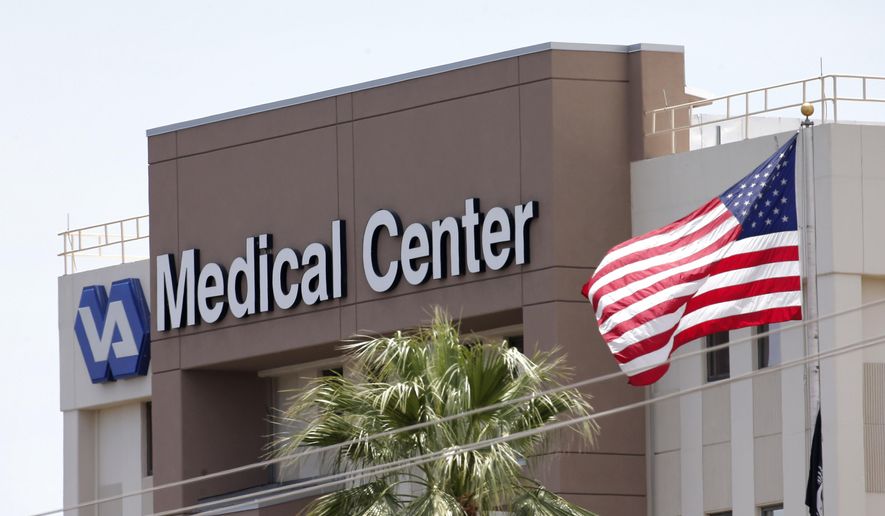A high-ranking Veterans Affairs official who oversees nearly a dozen medical facilities was charged with drunken driving and possession of a controlled substance on a Florida roadside at nearly 2 a.m. one night in April, repeatedly refusing a Breathalyzer before he was taken to jail, records show.
Though prosecutors later cited “concerns about the stop” and dropped the case, the arrest still raises questions about off-duty conduct standards and whether DeWayne Hamlin, who oversees a medical center and 10 outpatient clinics in Puerto Rico and the Virgin Islands, notified the VA to explain the source of an oxycodone pill found on him during the stop, according to records and interviews.
Mr. Hamlin, a member of the Senior Executive Service, an elite cadre of federal managers, was arrested just before 2 a.m. on April 26 after an officer saw him parked on a roadside in Pasco County with the car engine running, according to a police report obtained through an open records request.
“While speaking to DeWayne I observed his eyes were bloodshot, glassy and I could detect the strong odor of alcohol,” the arresting officer wrote. During a pat-down, the officer said he found an oxycodone pill in Mr. Hamlin’s front pocket.
Mr. Hamlin “advised he did not have a valid prescription for this medication and would not say anything else,” the officer stated in the police report.
The officer said he also found another unidentified pill and that Mr. Hamlin refused to take a field sobriety test or sign off on papers giving him notice that the sheriff’s office was seizing the vehicle. He was taken to jail and was released within hours.
SEE ALSO: VA depicts veterans as Oscar the Grouch
Two weeks later, a prosecutor for the Pasco County State’s Attorney’s Office recommended dropping the felony drug charge because “I believe there are issues with the stop in this case.” Manny Garcia, division director for the prosecutor’s office, declined to elaborate in a phone interview but said the DUI charge later was dropped, too.
In an email, Mr. Hamlin characterized the arrest as a “misunderstanding” and said that he has a medical disability for which he’s been getting treatment for the past year and a half.
He wrote that after he shared his medical records with the state’s attorney’s office, prosecutors did not pursue charges. He declined to discuss the source of the oxycodone or the officer’s statement about not having a valid prescription, saying he was uncomfortable sharing private health information.
Nonetheless, Mr. Hamlin’s oversight of VA medical facilities coupled with a report that he possessed a narcotic painkiller raises questions for the VA, said Joe Newman, spokesman for the Project on Government Oversight, a watchdog group that’s been investigating misconduct in the agency .
“It may not have to do with his work at VA but it raises the question of how he came to access a controlled substance,” Mr. Newman said. “It’s a legitimate question.”
Mr. Hamlin did not respond to a follow-up email on whether he notified VA officials about the arrest, and the VA’s public affairs office did not respond to phone and email messages from The Washington Times. Mr. Hamlin stated that an attorney advised him not to comment beyond his email statements.
Mr. Hamlin was named director of the VA’s Caribbean health care system based in San Juan, Puerto Rico, in December 2012, and his biography says he oversees up to 3,400 employees. He previously worked as the director of VA medical centers in Kentucky and Idaho.
Federal employment lawyer Cheri Cannon, a partner at DC-based Tully Rinckey, said employees in Mr. Hamlin’s situation should self-report to the agency.
“Just because you’re exonerated doesn’t mean the agency can’t take an administrative action or ask an inspector general or someone to investigate the circumstances of this and ask the guy — because he can’t be criminally charged with it now — where he got the drug, and he can’t plead the Fifth because it’s not a criminal matter anymore,” Ms. Cannon said.
She said federal agencies recognize that employees’ off-duty time is different than on-duty, but said the presence of the pill without a prescription raises questions.
“This isn’t how you want your senior executives to behave while they’re on leave,” she said.
• Jim McElhatton can be reached at jmcelhatton@washingtontimes.com.




Please read our comment policy before commenting.